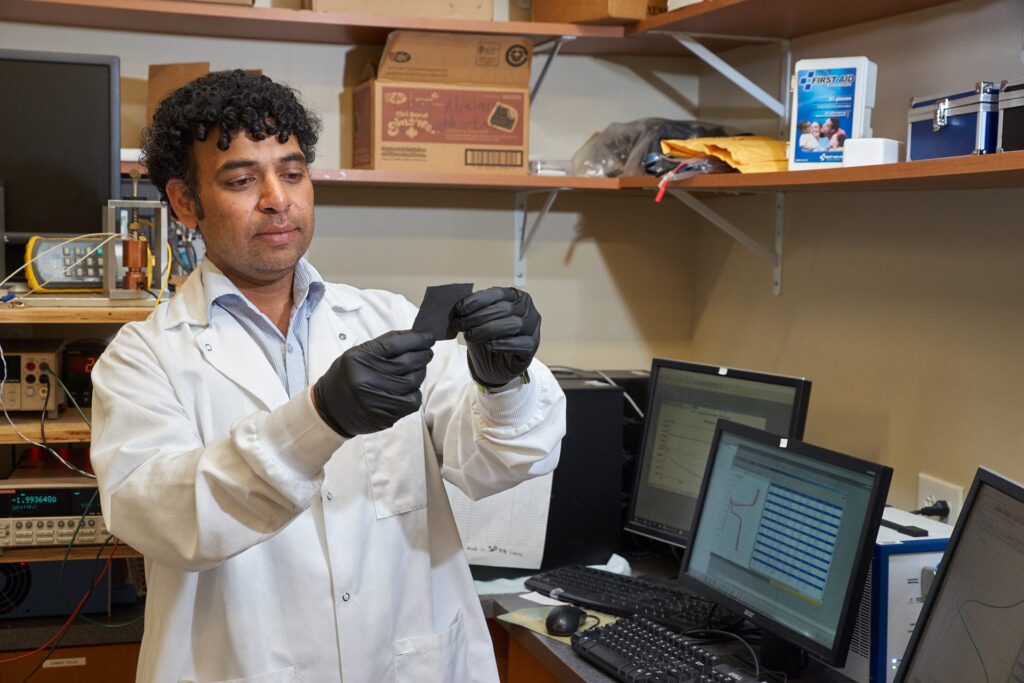
CLEMSON, SC – In a significant recognition of his contributions to the field, Ramakrishna Podila, a noted materials physicist at Clemson University, has been named a Fellow of the Institute of Physics.
Immediate Impact
The Institute of Physics, a prestigious professional society based in the United Kingdom and Ireland, counts approximately 21,000 members worldwide. Podila’s fellowship acknowledges his influential role in advancing modern condensed matter and applied physics.
“It’s an honor to be selected as a Fellow of the Institute of Physics. Having a panel of peer reviewers whom you do not know and with whom you have not collaborated telling you that you are deserving, is humbling,” Podila remarked.
Key Details Emerge
Podila’s research is renowned for its interdisciplinary approach, merging physics with chemistry, biology, and materials science. His work has notably spanned energy conversion and storage, nano-bio interfaces, and photonics and bioimaging.
His groundbreaking contributions in nanoscience and nanobiophysics have led to the discovery of fundamental phenomena in low-dimensional materials, with applications across energy, health, and photonics sectors.
Pioneering Contributions
Podila has spearheaded advancements in energy storage technologies, particularly with next-generation supercapacitors and batteries. His research also extends to ambient energy harvesting, notably through triboelectric nanogenerator (TENG) technology.
“My group’s work has been very multidisciplinary. Physics is at its core, but we venture into areas like energy, health, and optics. The boundaries between sciences are blurred and not really relevant anymore,” Podila stated.
By the Numbers
- Over 100 publications in scholarly journals
- Two U.S. patents
- One paper in materials chemistry listed in the top 1% of cited articles by Web of Science
Expert Analysis
Podila’s research group is currently exploring new frontiers in quantum mechanics and quantum biology. According to Podila, “A lot of biology ignores quantum phenomena.”
The group is investigating viral quasi-species to uncover potential quantum effects in biological environments, having recently submitted a paper on the subject and presented findings at the American Physical Society.
Next Big Thing
“Quantum biology, I think, is going to be the next big thing. I hope it starts a new body of work in applying quantum to how viruses replicate and in general, that could impact how evolution happens,” Podila noted.
Background Context
Podila’s academic journey began with a master’s degree in physics from the Indian Institute of Technology at Roorkee in 2007, followed by a Ph.D. in condensed matter physics from Clemson in 2011. Post-graduation, he served as a postdoctoral fellow in nanomedicine at Eastern Carolina University’s Brody School of Medicine.
Joining Clemson as an assistant professor in 2015, Podila was promoted to associate professor in 2020. His accolades at Clemson include the Roaring10 Award from the Clemson Young Alumni Council (2019) and the Rising Star in Discovery Award for the College of Science (2021). He is also a Fellow of the Royal Society of Chemistry.
What Comes Next
Podila’s research continues to receive support from top-tier agencies such as the National Science Foundation, National Institutes of Health, NASA, and the U.S. Army, alongside numerous global corporations.
As Podila and his team delve deeper into the nascent field of quantum biology, they aim to uncover groundbreaking insights that could transform our understanding of biological processes and evolution.
Their ongoing efforts underscore the potential of interdisciplinary research to drive scientific innovation and address complex challenges facing the world today.




